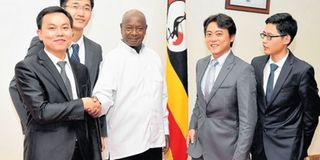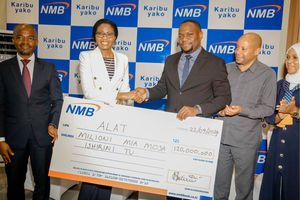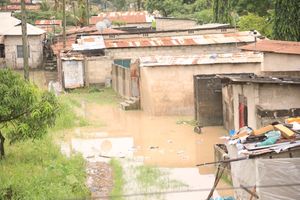Uganda sets eyes on more Chinese funding next year

President Yoweri Museveni with Chinese officials. Investments from China contributed over 40 per cent of the total FDI in Uganda in 2017. PHOTO | FILE
What you need to know:
Focus is on infrastructure development and attracting more investment from the Asian country, Ugandan governemt says
Kampala. The year 2018 ends on a good note for Uganda as the east African country eyes more financing and investment from China.
After the 2018 Beijing Summit of the Forum on China-Africa Cooperation held in early September, the Ugandan cabinet quickly formed an inter-ministerial committee to strategize on how the country can dovetail with China’s major initiatives to enhance cooperation with Africa backed by a 60 billion U.S. dollars’ pledge over the next three years.
The inter-ministerial committee is now looking at bankable projects that it can share with China for financing.
Infrastructure
Days before the Beijing summit, Ugandan President Yoweri Museveni told Xinhua in an interview that the country was focusing on infrastructure development and attracting more investment from the Asian country.
“We are likely to advance the project of the Standard Gauge Railway (SGR) that is in the government-to-government (talks),” Museveni said.
Experts say the SGR will reduce the cost of transport and spur economic development. The railway line is expected to reach the border areas with Rwanda, South Sudan and the Democratic Republic of Congo from the Kenyan seaport of Mombasa.
Over the past several years, Uganda has been touting infrastructure development as a key ingredient in fast-tracking its economic growth.
To finance the infrastructure development agenda, Uganda looked at China because of the country’s favourable lending terms compared to some of the western global financiers.
Mid this year, the Kampala-Entebbe Expressway, linking the capital Kampala to Entebbe International Airport, the country’s gateway to the rest of the world was completed. China financed the construction of the mega road project, the first of its kind in the country.
China is also financing the expansion of Entebbe International Airport. Official figures show that after completion of the first phase of the expansion, the cargo center can handle up to 150,000 metric tons of goods, compared to the previous 69,000 metric tons.
In the northern part of Uganda along River Nile, the world’s longest river, China is constructing the 600MW Karuma Hydropower Plant. While touring the facility in July, President Museveni said he was amazed by the progress of the works, noting that the plant will not only address Uganda’s inadequate power supply, but also youths have been skilled through the construction process.
Further upstream River Nile, in the central Ugandan district of Kayunga, construction of a Chinese-funded 183MW Isimba Hydropower plant is near completion. According to the Chinese engineers on site, power generated by the plant is expected to come onto the national grid early next year.
Economists have argued that the inadequate and yet expensive power was hindering the country’s economic development. The two power plants of Isimba and Karuma, when completed, are expected to address Uganda’s inadequate power supply.
Chinese investment
Uganda is among the top four investment destinations for China in sub-Saharan Africa, according to the Chinese embassy here. The Foreign Direct Investment (FDI) from China to Uganda was 219 million dollars in 2017. Investments from China contributed over 40 per cent of the total FDI in Uganda in 2017. (Xinhua)




